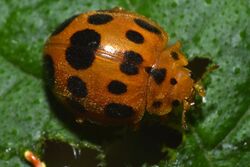Biology:Epilachna borealis
| Epilachna borealis | |
|---|---|

| |
| Scientific classification | |
| Domain: | Eukaryota |
| Kingdom: | Animalia |
| Phylum: | Arthropoda |
| Class: | Insecta |
| Order: | Coleoptera |
| Infraorder: | Cucujiformia |
| Family: | Coccinellidae |
| Genus: | Epilachna |
| Species: | E. borealis
|
| Binomial name | |
| Epilachna borealis (Fabricius, 1775)
| |
| Synonyms | |
| |
Epilachna borealis is a species of beetle that can commonly be found in the eastern United States . It is yellow with seven large black spots on each elytron and four small black spots on the pronotum. The species feeds on cucurbitaceous plants. Its common name is squash beetle.[1] It is often mistaken for a ladybug or a cucumber beetle because of its similar appearance.
Biology
The beetle lays a cluster of small yellow eggs on the leaf surfaces of cucurbitaceous plants.[2] Both adult beetles and larvae feed on leaf tissue in between veins,[3] and usually start by producing a semi-circle trench around their intended feeding area.[4] Adult squash beetles can also be found feeding on the rind of pumpkins and squash later in the season.[5]
References
- ↑ The Common Insects of North America by Lester A. Swan and Charles S. Papp, 1972, page 412
- ↑ Boucher, Jude (2014). "Squash Beetle". http://ipm.uconn.edu/documents/raw2/html/672.php. "'Eggs are yellow and stand erect on the leaf surface in a loose cluster with space between each egg.'"
- ↑ "Squash Beetle - Vegetables". https://extension.umd.edu/hgic/topics/squash-beetle-vegetables.
- ↑ Boucher, Jude (2014). "Squash Beetle". http://ipm.uconn.edu/documents/raw2/html/672.php. "'Both adults and larvae start feeding by producing a trench around the leaf tissue that they intend to consume.'"
- ↑ Boucher, Jude (2014). "Squash Beetle". http://ipm.uconn.edu/documents/raw2/html/672.php. "'Late in the season, large numbers of adult beetles may be found feeding on the rind of a single or many adjacent squash and pumpkin fruit.'"
Wikidata ☰ Q2646913 entry
 |

